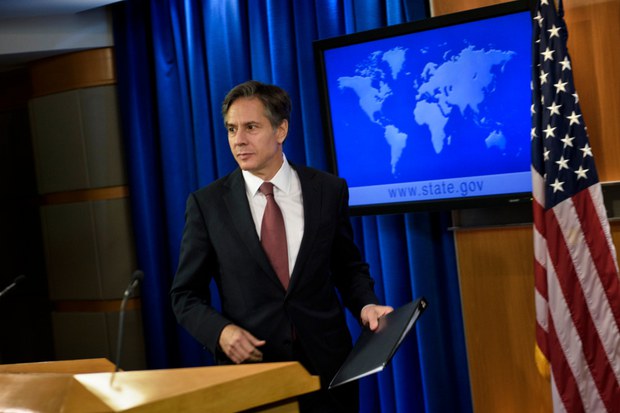Religious Intolerance Spurred Murders in Bangladesh, India: US
2016.08.10
Washington
 U.S. Deputy Secretary of State Antony Blinken prepares to announce the release of the 2015 International Religious Freedom Report, in Washington, Aug. 10, 2016.
U.S. Deputy Secretary of State Antony Blinken prepares to announce the release of the 2015 International Religious Freedom Report, in Washington, Aug. 10, 2016.
Religious intolerance motivated murders in Bangladesh and India while intolerance of diversity lingered in Indonesia, Malaysia and Thailand, the U.S. State Department said in its 2015 International Religious Freedom Report released Wednesday.
Propagation of the Islamic State’s (IS) hate-filled ideology worsened the problem, Deputy Secretary of State Antony Blinken told reporters as he announced the report’s release.
Blinken blamed IS, whom he referred to as Daesh, for ongoing attacks, including in Bangladesh.
“We’ve also seen Daesh try to adapt by encouraging indiscriminate attacks in as many places as possible – a market in Baghdad, a nightclub in Orlando, a promenade in Nice, a cafe in Dhaka, a square in central Istanbul,” Blinken told reporters, referring to the July 1 attack on the Holey Artisan Bakery café in Bangladesh’s capital.
IS claimed responsibility for the attack during which the assailants reportedly separated Muslims from non-Muslim hostages and killed 20 people. Bangladesh Home Minister Asaduzzaman Khan Kamal and other government leaders still claim that IS has no presence in their country.
Reporting on violence in Bangladesh in 2015, the State Department drew attention to six incidents between Feb. 26 and Oct. 31 that killed Avijit Roy, Washiqur Rahman, Ananta Bijoy Das, and Niladri Chottopaddhya and Faisal Arefin Dipan – who were described as secularist or anti-Islamic writers and publishers – and injured three others.
Throughout the country, Muslim leaders in some villages issued fatwas and members of religious minorities continued to claim they were discriminated, the report noted.
Sunni Muslims constitute 90 percent of Bangladesh’s 169 million population and Hindus 9.5 percent, according to State Department figures. The remaining population is Christian (mostly Roman Catholic) and Theravada-Hinayana Buddhist.
4 Die in Indian Riots
India last year suffered from religiously motivated killings, assaults and riots, the State Department said.
In January 2015, more than 5,000 people attacked the majority Muslim village of Azizpur, Bihar, after a young Hindu man was abducted and killed. Attackers burned 25 houses and killed four Muslims.
Unknown assailants killed writer M. M. Kalburi on Aug. 30. Local media speculated that he was killed for his anti-Hindu views.
In October, 41, authors, filmmakers, and other civil society members returned national and state-sponsored awards given by the government-sponsored Sahitya Academy (Academy of Literature) in protest of what they said was the growing religious intolerance in the country and the killing of “rationalists” and secularists.
Hindus constitute 79.8 percent of India’s 1.3 billion population, according to U.S. estimates. Muslims constitute 14.2 percent, Christians 2.3 percent, and Sikhs 1.7 percent.
Indonesian majority endorses tolerance
In Indonesia, the world’s largest predominantly Muslim country, non-governmental organizations (NGOs) warned of rising resentment against Shia Muslims in East Java, the heartland of the traditionally tolerant Sunni Muslims, according to the report.
Ahmadi Muslims reported discrimination in education and public services and complained about feeling under constant threat from militant groups.
The State Department report said that intolerant religious groups “illegally closed houses of worship and widely disseminated materials promoting intolerance.”
Indonesia’s two largest Muslim organizations – Muhammadiyah and Nahdlatul Ulama, which represent 70 million members – officially endorsed tolerance and reinforced those concepts during leadership conferences in August 2015.
About 87 percent of Indonesia’s 255.9 million people are Muslims, 7 percent are Protestants, 3 percent Roman Catholics and 1.5 percent Hindus, according to U.S. figures.
Malaysian government promotes Sunni Islam
In neighboring Malaysia, the State Department found on-going reports of intolerance of religious diversity.
While Malaysia’s constitution states that “Islam is the religion of the Federation; but other religions may be practices in peace and harmony,” the government promotes Sunni Islam above all other religions.
In several speeches, Prime Minister Najib Razak suggested that the nation would not accept “liberal” definitions for human rights that stray from the tenets of Islam.
On a positive note, there were fewer reported incidents of violence or aggression against opinions that differ from officially sanctioned positions on religious issues. Despite that improvement, a talk-radio presenter received death and rape threats after she starred in a satirical video criticizing the move to implement hudud (the Islamic penal law) in Kelantan State.
Of Malaysia’s 30.5 million people, 61.3 percent are Muslims, 19.8 percent Buddhists, 9.2 percent Christians and 6.3 percent are Hindus, according to U.S. figures. Additionally, 1.3 percent practice Confucianism, Taoism or other traditional Chinese philosophies and religions.
Thailand links religion, ethnicity
In Thailand, the military-controlled government, which seized power in a coup in May 2014, has maintained an interim constitution that does not guarantee religious liberty or protection from discrimination based on religion, the State Department reported.
Because religion and ethnicity are closely linked, it is difficult to categorize many incidents as being solely based on religious identity, it said.
“In the south, violence between ethnic Malay Muslims and ethnic Thai Buddhists hindered the ability of individuals to practice the full range of religious activities, according to human rights organizations,” the report stated.
Because they did not feel safe, Buddhist monks often conducted evening religious rites during daylight hours.
The State Department estimates that 93 percent of Thailand’s 68 million people are Buddhists and 5 percent are Muslims.







